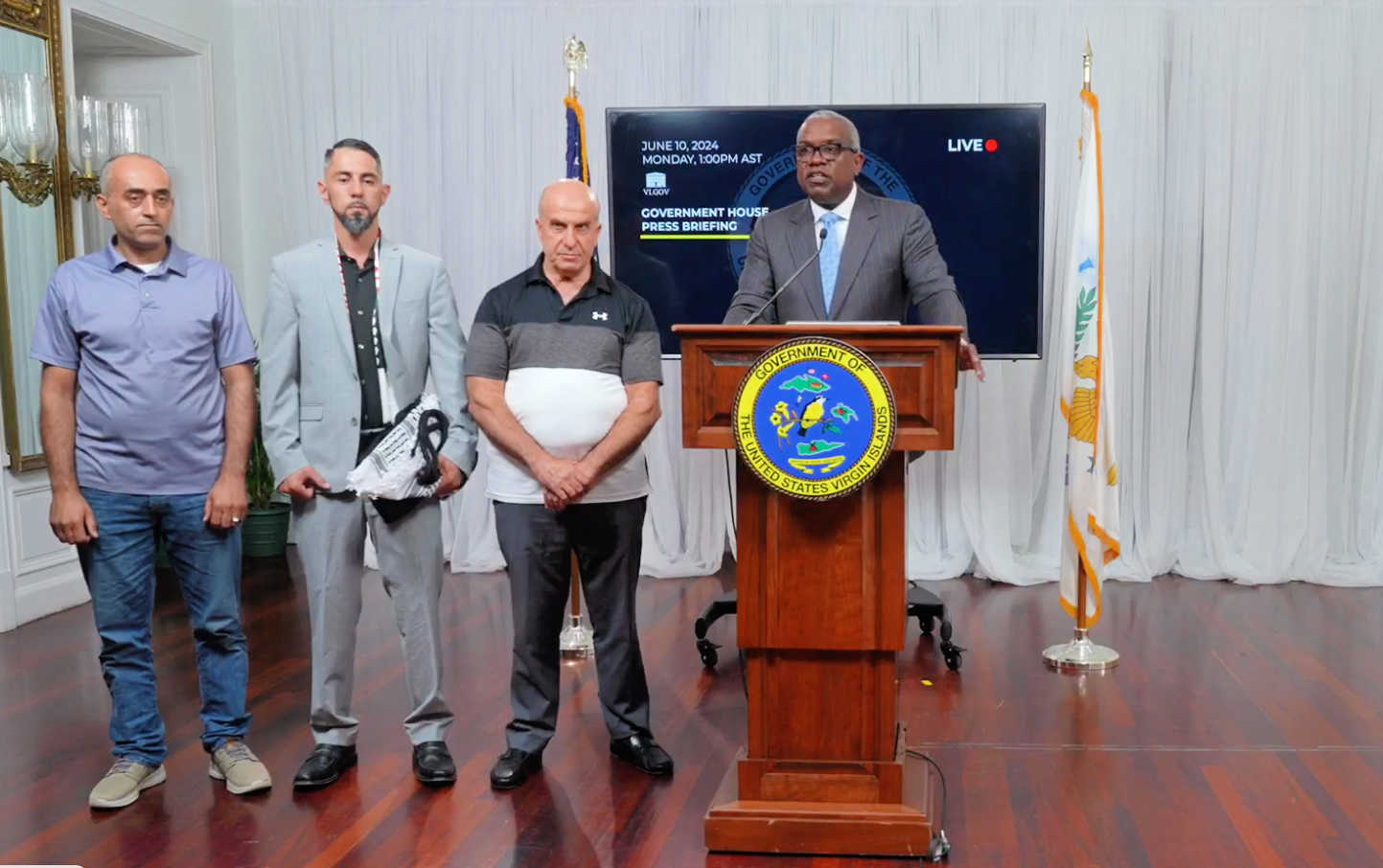Government
Draft Bill for Taxicab Industry Reform Delayed for Further Review and Amendments

Recent efforts to overhaul the Taxicab Commission in the U.S. Virgin Islands have hit a temporary pause, following detailed discussions among key industry players. Last week, a pivotal meeting brought together taxicab operators and officials from all three islands, spearheaded by Senator Donna Frett-Gregory. The aim was to address the ongoing operational challenges plaguing the Commission, which have been a source of concern in the taxi sector for more than a year.
At this gathering, Senator Frett-Gregory introduced a proposed bill aimed at restructuring the Commission. The bill envisages the creation of a new Division of Transportation and Taxicab Services within the Department of Licensing and Consumer Affairs. This division would inherit the current responsibilities of the Taxicab Commission, overseeing the administrative aspects of the taxi industry. Additionally, an Advisory Council comprising medallion owners, non-medallion owners, and public members would be established to recommend fees, formulate regulations, and suggest legislative modifications.
Governor Albert Bryan has expressed his support for this legislative initiative, emphasizing the need for comprehensive reform in taxi operations and broader industry regulations, including those for tour operators. “This legislation was really to cure the challenges that we’re having,” Senator Frett-Gregory noted in response to queries from Consortium journalists.
However, during a Senate Committee session on November 21, chaired by Senator Carla Joseph, it was revealed that the draft bill was withdrawn from the agenda. This decision, influenced by the “very robust discussion” at the stakeholder meeting, was made to allow for additional dialogue and amendments.
Senator Frett-Gregory acknowledged concerns raised by taxi operators, particularly from St. John, regarding the proposed transition back under the DLCA’s control. These apprehensions were rooted in a past audit that highlighted inadequate cash collection and management practices. However, she pointed out that the implementation of the ERP system by the Department of Finance has significantly improved payment processes, replacing manual receipts with automated ones.
Despite these advancements, broader issues persist, necessitating a more comprehensive examination. Frett-Gregory underscored the importance of “fairness and accountability” in the industry. She cited disparities, such as taxi operators needing a separate medallion for each vehicle, in contrast to limousine services operating multiple vehicles under a single license. “This requires a thorough analysis by a dedicated committee like the proposed advisory board to determine the optimal path forward for the industry,” she stated.
While the bill undergoes further refinement, the current Virgin Islands Taxicab Commission (VITCC) continues to face criticism from both the taxicab community and government officials. Senator Ray Fonseca, who also attended the stakeholder meeting, voiced his conviction that the existing Commission is falling short in addressing its myriad issues, thus failing to adequately serve the transportation and taxi industry.
The legislative team is actively working on the bill, anticipating its future presentation on the Senate floor, while continuing to address the concerns and needs of the taxicab community.
Government
Medicaid Funds Depleted, Major Road Repairs Planned: Bryan Provides Wide-Ranging Update

Governor Albert Bryan Jr. addressed several critical issues during Monday’s press briefing, focusing on infrastructure, housing, community welfare, and healthcare in the Virgin Islands.
Road Conditions and Repairs
Governor Bryan discussed the impact of recent weather on road conditions, particularly on St. Croix. “The rain, we’re grateful for it but it wreaks havoc on the roads,” he said. The wet weather has also accelerated vegetation growth, complicating roadside maintenance efforts. Additionally, some road projects have been delayed due to ongoing underground utility work. The North Shore Road will undergo significant work to install underground electrical and water services, while Mahogany Road and the main roadways in Frederiksted – Queen and King streets – are slated for extensive resurfacing. “We should be starting within the next 90 days or so to do that,” Bryan estimated.
Housing and Legislation
The governor emphasized the need for affordable housing and the aesthetic improvement of downtown areas, highlighting legislation on abandoned and derelict buildings. “We need to move this along and increase our affordable housing in our downtown spaces,” he stated. Bryan also addressed proposed sentencing reforms to give judges more discretion based on crime severity, saying, “We want to make sure that we have the appropriate amount of punishment for the crimes.”
Additionally, bills regarding gender changes on official documents, procurement requirements, and the combination of workers’ compensation with unemployment insurance are under legislative consideration.
Healthcare Funding and Medicaid
Healthcare funding was a key topic, with Bryan disclosing a recent bill requesting $3 million for Medicaid matching funds. “We ran out of Medicaid match money,” he said, noting the expansion of services during the Covid-19 pandemic led to increased demand and the subsequent depletion of funds. He emphasized the importance of maintaining access to affordable healthcare, highlighting the recent health fair that serviced over 2,400 residents.
Labor Shortage and Immigration
Addressing the territory’s chronic labor shortage, Bryan noted political challenges around immigration and visa waivers. He mentioned efforts to create work visa nexuses with the Dominican Republic and referenced an agreement allowing Trinidadian investors to settle in Miami as a potential model. He expressed confidence in meeting labor demands for upcoming projects under the Rebuild USVI initiative, stating that the four qualified bidders are already preparing to bring in workers.
Governor Bryan’s briefing provided a comprehensive overview of the challenges and initiatives aimed at improving the Virgin Islands’ infrastructure, housing, healthcare, and labor markets.
Government
Governor Bryan Urges Immediate Ceasefire in Gaza Strip; Proclaims USVI-Palestine Friendship Day

Governor Albert Bryan Jr. joined a global chorus calling for an immediate ceasefire in the Gaza Strip during Monday’s Government House press briefing.
The governor took this occasion to introduce Siri Hamad, a new public liaison for the Middle Eastern community. Hamad, a former member of the Public Services Commission, has collaborated with nearly every governor over the years, according to Governor Bryan.
Governor Bryan highlighted the significant contributions of the Palestinian community to the Virgin Islands’ development. “We are on the fourth generation of Palestinian descendants,” he said. “They are a critical cog in our business sector and part of the fabric of our community.”
Reflecting on the history of Palestinian entrepreneurs in the Virgin Islands, Bryan reminisced about the iconic traveling salesmen, who were pioneers in extending credit to their customers long before credit cards or bureaus existed. These businessmen were instrumental in shaping the local economy. Today, their descendants are recognized as Virgin Islanders of Palestinian descent, fully integrated into the community.
In a gesture of solidarity, Governor Bryan announced that November 29, recognized globally as the International Day of Solidarity with the Palestinian People, will also be celebrated as Palestinian Virgin Islands Friendship Day in the U.S. Virgin Islands.
Governor Bryan emphasized the universal desire for peace amidst global turmoil, stating, “As individuals, regardless of our skin color, origin, or religions, we should all want peace in this very tumultuous world.”
Government
USVI’s New Budget Strategy Aims to Address Revenue Shortfalls

The FY 2025 budget cycle commenced on Thursday as Senator Donna Frett-Gregory convened a hearing of the Senate Committee on Budget, Appropriations and Finance. Officials from the Office of Management and Budget presented an overview of the proposed executive budget for the upcoming fiscal year, themed “Fulfilling the Promise of Fiscal Solvency.” The proposed $1.44 billion budget includes a general fund allocation of nearly $897 million.
“Within the proposed general fund fiscal year 2025 budget of $896,803,010, you will find a continuation of the prudent and conservative approach we have employed since 2019,” stated OMB Director Jenifer O’Neal. This figure represents a $77 million decrease from the current general fund appropriation, resulting from the elimination of several one-time obligations and a reduction in the wage adjustment line item, O’Neal informed lawmakers.
The total budget of $1.44 billion also includes appropriated funds of $97,949,177, federal funds of $416,839,994, and other “non-appropriated funds” totaling $28,970,041.
According to O’Neal, the OMB has adopted a “cautious strategy” to produce a balanced budget that aligns with the estimated revenues for FY2025, aiming to ensure financial stability and resilience amid potential uncertainties. “Our commitment to conservative budgeting reflects our dedication to enhancing financial management and sustainable growth for the territory,” she said.
Despite current revenue shortfalls as of the third quarter of FY2024, the OMB’s projections anticipate growth in several categories. Personal income tax is expected to increase by 9% to $502.3 million, while corporate income is projected to rise by 23%. “With the launching of billion-dollar bid packages and the expected increase in construction activity, we project a significant increase of $19 million,” O’Neal explained.
Gross receipts are also expected to increase by 9% to $214 million, largely due to increased project bundles and construction activity. Excise taxes are projected to rise by 6%, from $42 million to $44.3 million. Notable revenue increases are also projected for hotel taxes.
The digital budget book indicates that the bulk of the FY2025 budget—$728,297,626—will be allocated to the general government. Public housing and welfare will receive $274,372,090, and education expenses are slated to receive $215,026,922. Health and Human Services will be allocated $65,010,796.
In her testimony, O’Neal highlighted several proposals from the FY2025 budget, including additional funds for the territory’s hospitals and the V.I. Waste Management Authority. These increased appropriations will ensure that “vital utilities are adequately budgeted for and can continue to meet the needs of our residents without falling behind again on their utility bills,” she said.
The $5 million budgeted for territory-wide road repairs underscores the commitment to enhancing transportation infrastructure and promoting economic development. An additional $5 million will be allocated to the Budget Stabilization Fund to maintain a prudent fiscal reserve, ensuring stability amid unforeseen challenges. New in the upcoming budget is extra funding for the Department of Sports, Parks, and Recreation for the operation of the recently recommissioned Clinton E. Phipps Racetrack.
Responding to Senator Novelle Francis, O’Neal announced that approximately $400,000 is allocated for the racetrack. “It’s been out of commission for quite a long time and had never been included in Sports and Parks budget,” she explained. The funds will cover utilities and personnel until a promoter takes over the management of the track.
For the Office of Management and Budget, the new budget represents a milestone in their commitment to transparency, accountability, and the prosperity of the territory.
-

 Education1 year ago
Education1 year agoEducation Board Seeks Input on Schools Through Comprehensive Survey
-

 Education2 years ago
Education2 years agoCTE Board Enthusiastic About New Curriculum Standards, Yet Anxious Over Apprenticeship Support
-

 Crime2 years ago
Crime2 years agoRegistered Sex Offender Detained for Illegal Firearm Possession During Annual Surveillance Drive
-

 Videos3 years ago
Videos3 years ago2022 Gubernatorial Election: Voters Speak Out
-

 Development1 year ago
Development1 year agoCosts Surge as Donoe Estates Housing Project Resumes with New Contractor
-

 Videos3 years ago
Videos3 years agoGubernatorial Teams Celebrate St. Croix’s Bull & Bread Day
-

 Videos3 years ago
Videos3 years agoWakanda’s Female Might: A Dive into ‘Black Panther: Wakanda Forever’
-

 Crime2 years ago
Crime2 years agoSt. John’s Westin Resort Scene of Armed Robbery, Prompting Heightened Police Vigilance




